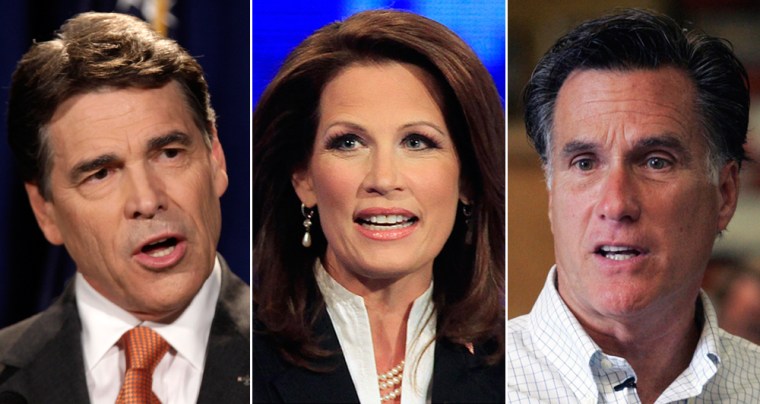It’s now three on a match atop the 2012 Republican presidential race, an inherently unstable dynamic that could singe each of the party’s leading contenders.
After a rapid-fire sequence of events, the race’s geometry has snapped into place, leaving a top tier of three major contenders: Rep. Michelle Bachmann, R-Minn., Texas Gov. Rick Perry, and former Massachusetts Gov. Mitt Romney, the somewhat flickering front-runner. As long as that three-way alignment holds, it probably benefits Romney. But if it shifts —most likely by Perry eclipsing Bachmann —Romney’s path quickly could become more treacherous.
The GOP race has been clarified by a succession of closely bunched developments last weekend: Bachmann’s victory in the Iowa straw poll, former Minnesota Gov. Tim Pawlenty’s subsequent decision to quit the race, and Perry’s entry from a position firmly on stage right. Taken together, these developments present the three main candidates with a new calculus of risks and opportunities.
For Romney, the new alignment offers one clear advantage: the possibility that the voters least likely to support him will be splintered between two opponents rather than consolidating behind one. Both in his 2008 bid, and in early 2012 polling, Romney has run best with voters holding at least a four-year college degree and those who do not identify as evangelical Christians —what might be called the party’s managerial wing. Romney has always struggled with the party’s populist wing, composed mostly of evangelical Christians and Republicans without a college degree.
The Republican coalition now divides virtually evenly between the economically-focused managers and the culturally-conservative, viscerally anti-Washington populists. In 2008, according to an ABC news cumulative analysis of exit polls, the GOP primary electorate split almost exactly in half between voters with and without a four-year college degree; likewise just under half of Republican voters (44 percent) identified as evangelical Christians.
Bachmann is an ideal opponent for Romney because she electrifies the populist voters most resistant to him, but remains a hard sell for most managers. Perry is a vastly bigger threat to Romney because Texas’ strong job-creation numbers gives him a much better chance than Bachmann of bridging the party’s two camps by attracting managerial Republicans. Yet Perry’s hard-right rhetoric and record (especially on social issues) makes it likely that he will still draw most of his support from the populist wing.
That dynamic creates the possibility that the populist voters most resistant to Romney will divide between Perry and Bachmann rather than uniting behind either. In theory, Romney could face a similar splintering of the managerial class if moderate former Utah Gov. Jon Huntsman develops into a serious competitor. But Huntsman fizzled at the Iowa debate and hasn’t yet proven he will be a major factor.
If the current dynamics hold, the number of populist votes Perry loses to Bachmann will vastly exceed the number of managerial votes Romney loses to Huntsman. That could allow Romney to squeeze past his rivals with plurality victories not only in states like Florida and Georgia closely divided between the two camps, but even in contests such as South Carolina or Iowa that tilt toward the party’s populist side.
That threat creates two instant imperatives for Perry. One is to maximize his reach into the managerial class. The other is to minimize Bachmann’s populist support. The two goals are somewhat inimical. The former requires Perry to reassure; the latter to rage. Of the two, probably the higher priority for Perry is preempting Bachmann. If she solidifies her credibility by winning Iowa, she will likely siphon away a substantial number of populist votes from Perry almost everywhere else. That could derail the Texas governor, which means he has more at stake in beating Bachmann in Iowa than conventional wisdom now assumes.
The best news for Bachmann this week is that Pawlenty’s departure removes the candidate most committed to a traditional strategy of winning Iowa through dogged grassroots organizing. But Perry’s entrance risks defining her ever more firmly as only an identity candidate, like Jesse Jackson or Mike Huckabee, mostly dependent on voters who feel a personal cultural connection to her. Those candidates can linger and sting —but they don’t win.
At last week’s debate, Bachmann attacked Pawlenty’s record and then Romney’s health-care plan in language that showed she’s comfortable functioning as an ideological enforcer for the overlapping tea party and evangelical vanguard. Perry seems equally determined to channel the unfiltered conservative id on issues from climate change to the Federal Reserve Board. That double-barreled attack from the right could help Romney position himself as a moderate, benefiting him against President Obama if he wins the nomination. But Romney has already signaled that he will respond at least partly by moving right himself, as he did in the Iowa debate, by declaring that he would reject tax increases matched even 10-1 with spending cuts.
The GOP race’s emerging three-way dynamic virtually assures that the party’s nominee in 2012 will run on an agenda to the right of any nominee since (at least) Ronald Reagan in 1980 —a prospect that may excite conservatives, and hearten nervous Democrats, in equal measure.
The article, "Romney's Advantage: Will Perry, Bachmann Divide the Voters Most Resistant to Him," first appeared in the National Journal.
